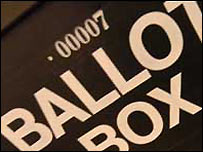Postmodernism...Scholars and historians most commonly hold postmodernism to be a movement of ideas that has both replaced and extended
modernism by countering and borrowing from a number of modernism's fundamental assumptions. For example, modernism places a great deal of importance on ideals such as
rationality,
objectivity, and progress -- as well as other ideas rooted in
The Enlightenment, and as
positivist and
realist movements from the late 19th century -- while postmodernism questions whether these ideals can actually exist at all.
Postmodernism adherents often argue that their ideals have arisen as a result of particular
economic and
social conditions, including what is described as "
late capitalism" and the
omnipresence of
broadcast media, and such conditions have pushed society into a new
historical period. However, a large number of thinkers and writers hold that postmodernism is at best simply a period, variety, or extension of modernism and not actually a separate period or idea. In a nutshell, the pro-postmodernism argument runs that
economic and
technological conditions of our age have given rise to a decentralized, media-dominated society in which ideas are
simulacra and only inter-referential representations and copies of each other, with no real original, stable or objective source for
communication and
meaning.
Globalization, brought on by innovations in
communication,
manufacturing and
transportation, is often cited as one force which has driven the decentralized modern life, creating a culturally pluralistic and profoundly interconnected global society lacking any single dominant center of political power, communication, or intellectual production.
Scholars argue that such a decentralized society inevitably creates responses/perceptions that are described as post-modern, such as the rejection of what are seen as the false, imposed unities of
meta-narrative and
hegemony; the breaking of traditional frames of genre, structure and stylistic unity; and the overthrowing of categories that are the result of
logocentrism and other forms of artificially imposed order. Instead, they value the
collage of elements, the play and juxtaposition of ideas from different contexts, and the
deconstruction of symbols into the basic dynamics of power and place from which those symbols gain meaning as
signifiers. In this it is related to
post-structuralism in philosophy,
minimalism in the arts and music, the emergence of
pop, and the rise of mass media.Scholars who accept the division of post-modernity as a distinct period believe that society has collectively eschewed modern ideals and instead adopted ideas which are rooted in the reaction to the restrictions and limitations of those ideas, and the present is therefore a new historical period. While the characteristics of postmodern life are sometimes difficult to grasp, most postmodern scholars point to very concrete and visible technological and economic changes that have brought about the new types of thinking.Critics of the idea reject that it represents liberation, but instead a failure of creativity, and the supplanting of organization with
syncreticism and
bricolage. They argue that post-modernity is obscurantist, overly dense, and makes strong assertions about the sciences which are demonstrably false.There are often strong political overtones to this debate, with
conservative commentators often being the harshest critics of post-modernism. There is a great deal of disagreement on whether or not these technological and cultural changes represent a new historical period, or merely an extension of the modern one. Complicating matters further, others have argued that even the postmodern era has already ended, with some commentators asserting culture has entered a
post-postmodern period.The opportunity to generate polemic in any discussion of the postmodern is prodigious. Keeping an eye on the two following basic issues can often help orient one to the various politics and agendas that tend to cloud or obscure different discussions of the postmodern. One is the problem of critical distance and the other is a problem of
nomenclature.1) What is the author's take on the idea that critical distance and the potential for real
objectivity are unattainable? This question can be seen at work in both Haraway's comments (see below) about what she sees as Jameson's main thesis on postmodernism, and in Laclau's mapping of an "analytic terrain" where the "given" is no longer a viable myth. Pejoratively put, this collapse of critical distance is decried as "aestheticist" or as aestheticizing
ideology in many discussions (Norris). The usual implication is that the culprits are decadent, apolitical and dangerously irrational. The historical antecedents referred to are often
Walter Pater and
Oscar Wilde's "
dandyism" and the "
art for art's sake" movement. Whereas for many differently oriented commentators those same decriers of aestheticism are often themselves denounced as totalitarian rationalists,
modernists, "mere" moralizers, reactionaries and unsophisticated know-nothings (Haraway; Giroux).2) The terms postmodern,
postmodernity and postmodernism can be seen to associate or conjure different meanings: the term postmodern is inclusively ambiguous of what people mean when they talk about issues that come up in discussions of
postmodernity and postmodernism.
Postmodernity is a sign for contemporary society, for the stage of technological and economic organization which our society has reached. Postmodernism then can be, as Eco says, a "spiritual" category rather than a discrete period in history; a "style" in the arts and in culture indebted to ironic and parodic
pastiche as well as to a sense of history now seen less as a story of lineal progression and triumph than as a story of recurring cycles.
Analogously, and only for purposes of illustration, the condition of
modernity is often spoken of as the rapid pace and texture of life in a society experienced as the result of the
industrial revolution (Berman). However, modernism is a movement in culture and the arts usually identified as a period and style beginning with
impressionism as a break with
Realism in the fine arts and in literature. Prior to
modernism one finds periods and styles associated with other distinct aesthetic movements, e.g.,
Romanticism and
Realism. For instance, both Blake and Balzac, Romantic and Realist representatives respectively, could be said to have had some experience of
modernity, to have lived during the early stages of the expansion of bourgeois or industrial capitalism and technology and science, whereas no one thinks of their respective arts or modes of expression as obviously "modernist."



